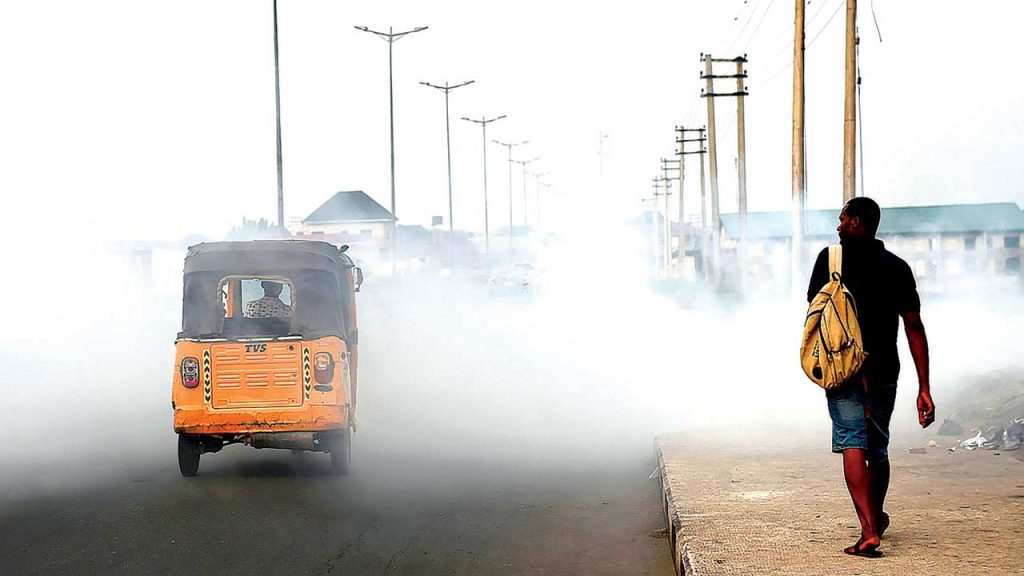The Nigerian government has announced an ambitious plan to reduce air pollution by 50% by 2030. This initiative unveiled at a press conference in Abuja by the Minister of State for Environment, Dr. Iziaq Salako, aims to combat the severe impact of air pollution on public health, the economy, and the environment.
Nigeria, which ranks as the third most polluted country in Africa, has launched a comprehensive strategy including the establishment of air quality monitoring stations nationwide and a mobile app providing real-time air quality data across major cities.

The announcement coincided with this year’s observance of the International Day of Clean Air for Blue Skies, where Dr. Salako highlighted the urgency of addressing Nigeria’s pollution crisis. He stressed the grave risks air pollution poses to human health, noting that it has become the world’s largest environmental health risk, with 99% of the global population exposed to unhealthy air quality. Air pollution, primarily driven by human activities such as vehicular emissions, illegal refining, gas flaring, and refuse burning, is estimated to cost the global economy $8.1 trillion annually, according to data from the United Nations Environment Programme (UNEP).
Nigeria’s commitment is part of a broader global effort to reduce air pollution by half within the next decade. The government is developing a National Policy on Air Quality Management and launching the National Clean Air Campaign, dubbed #BreatheEasyNigeria, to support this goal. This campaign will involve celebrities and influential figures as Clean Air Ambassadors, raising public awareness about the critical need for clean air.
One of the key elements of the government’s strategy is the creation of a reliable national database through the establishment of air quality monitoring stations. These stations will provide real-time data, supported by a mobile app that offers the public access to Nigeria’s Air Quality Index (AQI) data. This innovation is expected to foster informed policy-making and environmental management at both national and state levels.
Dr. Salako also revealed the commencement of a pilot Quality Assurance/Quality Control (QA/QC) Industrial Emission Monitoring Scheme, aimed at reducing industrial pollution. This scheme will enhance Nigeria’s capacity to manage and monitor emissions, with a national rollout expected soon.
Air pollution in Nigeria is a pressing issue, with the country ranking high on the global pollution index. The 2021 World Air Quality Report listed Nigeria as the third most polluted country in Africa, and in 2023, the country’s PM2.5 concentration was 4.8 times higher than the World Health Organization’s recommended limit. These figures underscore the need for swift and decisive action.
At the press conference, Dr. Salako emphasized that addressing air pollution is not just a matter of environmental preservation but also a necessity for public health and economic growth. He warned that failure to reverse the current levels of pollution would result in severe health consequences, particularly for vulnerable groups such as the elderly, women, and children.
Is Dangote Selling Fuel or Vodka?
To tackle these challenges, the Nigerian government is working with the National Environmental Standards and Regulations Enforcement Agency (NESREA) and the Standards Organization of Nigeria to develop a national framework for emissions testing. This framework will guide states in setting up vehicular and generator emissions testing centres to ensure compliance with air quality standards.
In his address, Dr. Yakubu Mohammed Baba, Registrar of the Environmental Health Council of Nigeria (ECHON), called for increased cooperation among agencies under the Ministry of Environment to address the air pollution crisis. He stressed the importance of collaboration in ensuring clean air for all Nigerians, reinforcing the idea that collective action is necessary to mitigate the dangers of air pollution.





